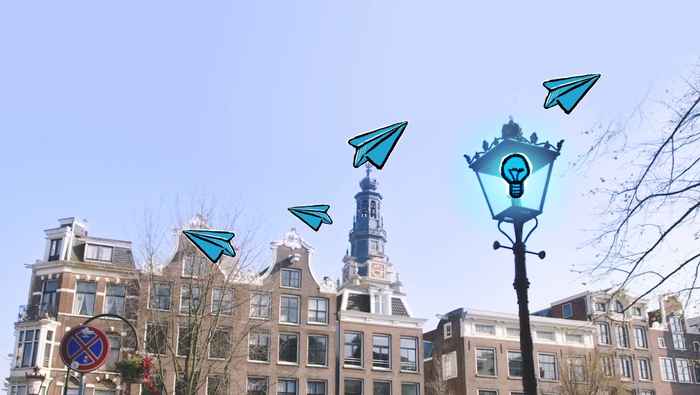Highlighted: IIS elective 'Building Bridges'
28 June 2022
Pauline Vromans was born in the Netherlands, raised in Spain and Switzerland and returned to the Netherlands when she was fifteen. This has had a considerable impact on her personal development: time and again she has learned to adapt to different contexts, to communicate in different ways and to build bridges between cultures. The different ways of communicating that she learned when she was young involve more than language alone: they involve specific skills, an awareness and knowledge of how to deal with people from other cultures. Every culture has its own 'manual' for communicating effectively. Knowledge of cultural codes is, therefore, necessary when working together in a diverse and multicultural team.
Working independently and collaborating constructively
In the elective course Building Bridges for Local-Global Challenges, students work together in online international project groups to learn to connect the various perspectives. Vromans explains: "The team work in the course is not only aimed at solving global issues, but also at seeing what happens in such an international group and learning from that experience. Most Dutch people are quite direct, they say exactly what they think. In other cultures, people do not do that directly, but they try to get their message across by giving suggestions or hints, or telling stories. Communication is not always explicit, it is often non-verbal. What does someone's body language say? And what does somebody's facial expression say?"
Moreover, a distinction can be made in terms of the person who speaks: the sender is already part of the message. This can be applied to all kinds of levels. Vromans describes: "In the past two years, the Dutch Prime Minister and the Minister of Health have informed us in press conferences about the state of affairs, and given us certain 'urgent requests' to prevent the spread of the Coronavirus. In the Netherlands, they did not give us many rules to follow, but they urged us to 'take our own responsibility'. In Spain and Portugal, it was the army that enforced strict rules on their inhabitants. This is an example of how different cultures deal with hierarchy in different ways. This can also be applied to an international team: do you want someone to tell you what to do or not? Do you prefer to work on your own initiative, or do you wait for someone else to tell you what to do, and how?"

Globally, we are faced with very important challenges and everything is becoming more and more interconnected. If you learn how to deal with this as a student, you might actually make a change or be a part of a societal transition. Skills such as entrepreneurship and intercultural competences are needed in all kinds of professions, whether you become a nurse, work for a multinational or in politics: you will always have to deal with people who are different from you and have different ideas than you. And if you want to innovate or really change a system, you need entrepreneurial skills.Pauline Vromans, lecturer of the IIS elective 'Building Bridges for Local-Global Challenges'
In the course, participants are given the opportunity to try out different communication styles and directly implement these in intercultural collaboration. In small groups, thirty students from the UvA team up with students from other European universities that are part of the NICE-network. They learn how to communicate and make decisions online with their international team members. Using an online platform, they make progress in reading about entrepreneurship and intercultural collaboration, reflecting and making assignments.
Building meaningful bridges
In addition, the group of UvA students - of different nationalities, ages and disciplines - meet on campus to discuss issues, experiment and engage in hands-on exercises that can then be immediately put to use in the international teams. Practising direct and indirect communication styles, for example, in Speed dating across cultures. Each student is given two minutes to convince another in a direct or indirect communication style. After two minutes, they switch partners and communication styles. And in a simulation game, students experience the excitement and discomfort of communicating in a new culture. In this way, they learn how to adapt their communication style to their interlocutor.

In the meetings with the UvA students, various cases and incidents are discussed. What happens if there appears to have been miscommunication? It may have to do with different habits, different ways of communicating and different levels of decisiveness. By doing an exercise on values, culture and behaviour, participants become aware of their own role and how they like to work together in a team. In a series of small assignments, students put together a portfolio, in which their personal development becomes clear.
During the group work, participants also gain valuable entrepreneurial skills. Vromans explains: "Students learn to do project work and to think about decision-making: how do you solve a major global issue as a group? They learn to think like a social entrepreneur: what does it take? They can interview possible users of their invented product or service in the local context, or observe how people deal with a certain challenge in order to better understand the challenge."
Cultural and disciplinary awareness
It requires different perspectives to look at and solve global issues, because they are so complex that there is no simple solution. Vromans points out: "From an intercultural perspective, it is interesting to work on these issues in an interdisciplinary group, because everyone comes to the group with their 'culture' from their own discipline. You do not only have a specific culture because of your nationality, but also because of how you have learned to deal with knowledge and the way you think about certain topics. This is very much influenced by the discipline you have been schooled in. Think of specific terms that are used, the expectations you have of a seminar or the structure of a lecture, that is also different per study programme and discipline."
The UvA students who participate in the course come from a wide range of disciplines, including Future Planet Studies, philosophy, business administration, law, political science, psychology, European studies and media and information studies. Students already learn a lot from students from other disciplines. Furthermore, the group not only includes Dutch students, but also from India, China, Germany, Austria, Spain, Korea and the United Kingdom.
Vromans continues: "Every participant gains something different from the course. Some students are quick to come up with a solution for the global challenge of their choice, while others learn a great deal from what we do in the group or because everything goes wrong in their team. That can be frustrating, but also very enriching. It's not so much about the end result - there's no exam that they are studying for - but more about the journey."
Openness and curiosity
'Building Bridges' is a very different course than what most students are used to during their degree programme. Vromans says: "Not knowing what to expect can be fun, but difficult as well, sometimes. In some ways, students have to go out of their comfort zone in this course, which can be a little frightening. So were my own experiences abroad, but those are the experiences you learn the most from in the end. For the students who have not had, or will not have, a study abroad experience because they already have a child, no financial means or other personal circumstances, this is a very nice alternative to still have a study abroad experience, without actually going abroad."
For those students who do physically want to go abroad, an extension of the course is possible. The Summer School, which takes place at one of the partner universities in July, continues with the three main elements: global issues, intercultural competences and entrepreneurship. To make it possible for all students to participate, scholarships have also been made available. "During the Summer School, the teams will further develop their presented solutions for the chosen global challenge. And it gives students the opportunity to meet their team members for the first time, just like the people from the other groups”, according to Vromans.

More information
Pauline Vromans founded her own company after studying Human Resource Management and Culture, Organization & Management, and further specialised in intercultural competences with a PhD in San Diego. Vromans has worked at the UvA since 2013 and is part of the Local-Global Think Tank at the Institute for Interdisciplinary Studies (IIS) since December 2021. There, she develops various formats to solve complex global issues using a local approach.
The course Building Bridges for Local-Global Challenges was launched this academic year as one of the starting points for transition-focused education at the IIS. In the academic year 2022-2023, the course will be on the curriculum again in the second semester.